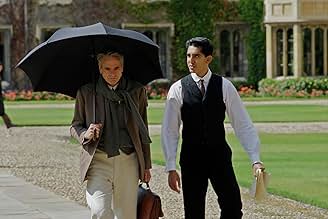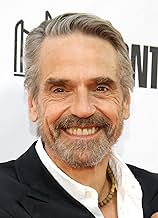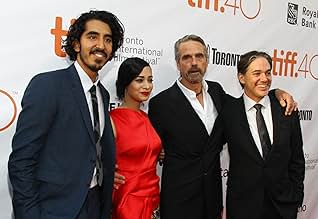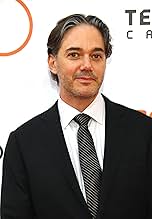यह फ़िल्म अग्रणी भारतीय गणितज्ञ, श्रीनिवास रामानुजन के जीवन और उनके अकैडमिक करियर की कहानी और उनके गुरु, प्रोफेसर जी.एच. हार्डी के बारे में चित्रण करती है.यह फ़िल्म अग्रणी भारतीय गणितज्ञ, श्रीनिवास रामानुजन के जीवन और उनके अकैडमिक करियर की कहानी और उनके गुरु, प्रोफेसर जी.एच. हार्डी के बारे में चित्रण करती है.यह फ़िल्म अग्रणी भारतीय गणितज्ञ, श्रीनिवास रामानुजन के जीवन और उनके अकैडमिक करियर की कहानी और उनके गुरु, प्रोफेसर जी.एच. हार्डी के बारे में चित्रण करती है.
- पुरस्कार
- 1 जीत और कुल 3 नामांकन
Dhritiman Chatterjee
- Narayana Iyer
- (as Dhritiman Chaterji)
Kevin McNally
- Major Percy Alexander MacMahon
- (as Kevin R. McNally)
फ़ीचर्ड समीक्षाएं
Just saw "The Man Who Knew Infinity" at The Sun Valley Film Festival. So happy to see quality films make their US premiere in Sun Valley. Kudos to the non profit group. Must see movie with outstanding story, production and casting led by J. Irons. Independent films like these deserve to be seen & noticed. Opens NY/LA late April. Superb direction from Matt Brown with incredible sets and locations, especially location at Trinity College. Thought about the diversity issue facing the Academy and after seeing this movie, realized it was an issue for a brilliant mind like the lead against the English back in the day. The effort it took to make this film on a tight budget with incredible locations is a credit to the entire crew!
Biopics have always interested me, regardless of whether liberties are taken with the facts (the case with quite a lot) many of them are very well made and fascinating while also featuring lead performances that do the subject in question justice. Srinivasa Ramanujan, his story and his ground-breaking contributions to mathematics also fascinate and worth telling and looking up, and it was great to have the opportunity to have them better known.
Another selling point for me was Jeremy Irons, have always loved him if again more for his early work up to 'Lolita'. Although he is deservedly lauded by many, to me he is deserving of more credit, due to generally being restricted to (mostly) supporting roles in hit (this, 'The Borgias', 'Margin Call' and 'Henry IV' for examples) and miss ('Assassins Creed', 'Batman v Superman', 'The Time Machine', though he was among the better assets in all three, and especially 'Dungeons and Dragons' which is in every way indefensible) output since 'Lolita' that don't show his full talent, even when in a vast majority of them he is one of the bright spots, that people sometimes forget how brilliant a lot of his early work is. This does sound irrelevant, but it isn't really once saying what my thoughts on his performance here is and how it fares compared to his other work. Despite what 'The Man Who Knew Infinity' had going for it, part of me was not sure as to whether it would completely work for me, with Maths always having been one of my least favourite subjects in school. Never got my head around some of it and it didn't engage me as much as Music, History, English, French and German did, while always appreciating its importance and why it is considered a compulsory subject in primary and secondary schools up to A-Levels.
On the most part, 'The Man Who Knew Infinity' was a winner and struck a chord with me. It is nowhere near close to flawless and it falls short of being a great film. It is though well-intended and earnest, that mostly compels and much of it well written and acted. Despite inaccuracies and what made Ramanujan's work so ground-breaking not delved into enough it does try to treat this remarkable man and his story respectfully and does well in making Maths interesting and accessible. Very like 'A Beautiful Mind', 'The Man Who Knew Infinity' helped make me appreciate Maths much more.
Didn't find the scenes in Madras/India depicting Ramanujan's personal life anywhere near as interesting as the scenes in Cambridge and particularly the scenes between Ramanujan and Hardy, and to me they are the film's biggest fault. They are nicely filmed and the scenery is beautiful and it did show his motivations which was great. Unfortunately, they are also far too slow-paced (which hurt especially the first twenty five or so minutes when we don't see Hardy), mostly uneventful when the film is switching back and forth, contains very soapy writing, indifferent chemistry between Ramanujan and his wife and the acting has been described before as a mix of cold and exaggerated which sums it up very well.
There are moments of less than elegant camera work, indicating some inexperience, where some shots are disappointingly out of focus in a way that makes one slightly queasy. Can understand the criticism of 'The Man Who Knew Infinity' not doing much new for the biopic genre and playing it too conventionally and safely, with an outcome that is foreseeable and slightly on the pat side. And as said, it could have delved more into what made Ramanujan's work so ground-breaking and focused less on his personal life.
However, 'The Man Who Knew Infinity' does have quite a lot working in its favour. The photography is not consistent but quite a lot of it is nicely done and complements the beautifully evocatively rendered Indian landscapes and the authentic 1914 Cambridge setting very well. Trinity College is shown in all its glory, in both the exteriors and interiors it looks wonderful. The music may not stick in the head but it serves its purpose well, it's sympathetic, not too syrupy and it fits at least. Again, there is inconsistency in the direction, not always focused visually and very pedestrian in the scenes in Madras, but it helps make the story intriguing and accessible and is a triumph in the scenes between Ramanujan and Hardy (particularly in the latter stages), Hardy and Littlewood's scenes are also well done.
Script is mostly intelligent and sincere, not being too wordy, too complicated, too treacly or overly simple. It is especially good in Hardy's dialogue and speeches which are beautifully written (especially the "who are we to question the Ramanujan" one). Irons' Shakespearean-like delivery in that wonderful unmistakable voice he has, that always makes things that are usually dull engaging, helps quite a bit. The story once it got going engaged, moved and inspired me, didn't understand all the maths but it still intrigued and illuminated me and found myself really caring and identifying with Ramanujan, rooting for his overcoming significant adversity. The chemistry between Ramanujan and Hardy is complex, never biased, intriguing to watch develop and heartfelt, it is the heart of the film and the driving force of the drama and one of the film's biggest strengths in that it rises the film above being completely routine. The characterisation of Hardy is similarly a triumph, a far more complex character that one seems to think when first introduced to him, the most developed (more so than Ramanujan himself and that is without seeing glimpses of his personal life really) and therefore the most interesting. Really appreciated how Ramanujan's adversity is not done in a way that was overdone or pantomimic, some of it having genuine tension, and also showing the harships England were going through at the time.
Notwithstanding big reservations with how Ramanujan's family were characterised here, the acting is very good. Dev Patel may not look like Ramanujan, too young, too tall and too handsome, and may seem a miscast physically, but is still great in interpretation due to exuding more emotion, charm and passion than seen before from him by me and made me care and root for such a remarkable man. To me, this is one of his better performances and he works incredibly well with Irons, the complexities of the relationship between the two portrayed with nuance and passion. Their scenes in the second half of the film are particularly beautifully done and the ending is initially inspiring and then very touching in Hardy's tribute. Toby Jones is endearing as Littlewood and the British cast, including Anthony Calf and Jeremy Northam, are sterling and don't overplay or phone in. The acting honours though belong to Irons, who is absolutely outstanding here as Hardy and gives one of his best performances in one of not many roles in recent years to fully show how great an actor he truly is (he actually shows it in a vast majority of his work, just that too many times he is well above what he is given). Because there is a lot of meat to Hardy and Irons wrings every ounce of juice out of it without ever overplaying, his eyes, gestures and face telling so much in a remarkably subtle way, yes there is much more to Irons' appeal than his voice. It is an authoritative and sincere performance in a way that's powerfully understated, full of gravitas and never less than compelling, he brings an edge to Hardy while expertly softening it when needed in the emotional latter stages when he becomes more sympathetic. The lack of big awards attention for his performance here is in my mind criminal and like 'Dead Ringers' (except not as bad) all over again in that it was a big inexplicable oversight that year.
Summarising, a well above average film though not flawless or great, though Trinity College, the chemistry between Patel and Irons and Irons' performance are massive assets and help make it a much better film. 7/10
Another selling point for me was Jeremy Irons, have always loved him if again more for his early work up to 'Lolita'. Although he is deservedly lauded by many, to me he is deserving of more credit, due to generally being restricted to (mostly) supporting roles in hit (this, 'The Borgias', 'Margin Call' and 'Henry IV' for examples) and miss ('Assassins Creed', 'Batman v Superman', 'The Time Machine', though he was among the better assets in all three, and especially 'Dungeons and Dragons' which is in every way indefensible) output since 'Lolita' that don't show his full talent, even when in a vast majority of them he is one of the bright spots, that people sometimes forget how brilliant a lot of his early work is. This does sound irrelevant, but it isn't really once saying what my thoughts on his performance here is and how it fares compared to his other work. Despite what 'The Man Who Knew Infinity' had going for it, part of me was not sure as to whether it would completely work for me, with Maths always having been one of my least favourite subjects in school. Never got my head around some of it and it didn't engage me as much as Music, History, English, French and German did, while always appreciating its importance and why it is considered a compulsory subject in primary and secondary schools up to A-Levels.
On the most part, 'The Man Who Knew Infinity' was a winner and struck a chord with me. It is nowhere near close to flawless and it falls short of being a great film. It is though well-intended and earnest, that mostly compels and much of it well written and acted. Despite inaccuracies and what made Ramanujan's work so ground-breaking not delved into enough it does try to treat this remarkable man and his story respectfully and does well in making Maths interesting and accessible. Very like 'A Beautiful Mind', 'The Man Who Knew Infinity' helped make me appreciate Maths much more.
Didn't find the scenes in Madras/India depicting Ramanujan's personal life anywhere near as interesting as the scenes in Cambridge and particularly the scenes between Ramanujan and Hardy, and to me they are the film's biggest fault. They are nicely filmed and the scenery is beautiful and it did show his motivations which was great. Unfortunately, they are also far too slow-paced (which hurt especially the first twenty five or so minutes when we don't see Hardy), mostly uneventful when the film is switching back and forth, contains very soapy writing, indifferent chemistry between Ramanujan and his wife and the acting has been described before as a mix of cold and exaggerated which sums it up very well.
There are moments of less than elegant camera work, indicating some inexperience, where some shots are disappointingly out of focus in a way that makes one slightly queasy. Can understand the criticism of 'The Man Who Knew Infinity' not doing much new for the biopic genre and playing it too conventionally and safely, with an outcome that is foreseeable and slightly on the pat side. And as said, it could have delved more into what made Ramanujan's work so ground-breaking and focused less on his personal life.
However, 'The Man Who Knew Infinity' does have quite a lot working in its favour. The photography is not consistent but quite a lot of it is nicely done and complements the beautifully evocatively rendered Indian landscapes and the authentic 1914 Cambridge setting very well. Trinity College is shown in all its glory, in both the exteriors and interiors it looks wonderful. The music may not stick in the head but it serves its purpose well, it's sympathetic, not too syrupy and it fits at least. Again, there is inconsistency in the direction, not always focused visually and very pedestrian in the scenes in Madras, but it helps make the story intriguing and accessible and is a triumph in the scenes between Ramanujan and Hardy (particularly in the latter stages), Hardy and Littlewood's scenes are also well done.
Script is mostly intelligent and sincere, not being too wordy, too complicated, too treacly or overly simple. It is especially good in Hardy's dialogue and speeches which are beautifully written (especially the "who are we to question the Ramanujan" one). Irons' Shakespearean-like delivery in that wonderful unmistakable voice he has, that always makes things that are usually dull engaging, helps quite a bit. The story once it got going engaged, moved and inspired me, didn't understand all the maths but it still intrigued and illuminated me and found myself really caring and identifying with Ramanujan, rooting for his overcoming significant adversity. The chemistry between Ramanujan and Hardy is complex, never biased, intriguing to watch develop and heartfelt, it is the heart of the film and the driving force of the drama and one of the film's biggest strengths in that it rises the film above being completely routine. The characterisation of Hardy is similarly a triumph, a far more complex character that one seems to think when first introduced to him, the most developed (more so than Ramanujan himself and that is without seeing glimpses of his personal life really) and therefore the most interesting. Really appreciated how Ramanujan's adversity is not done in a way that was overdone or pantomimic, some of it having genuine tension, and also showing the harships England were going through at the time.
Notwithstanding big reservations with how Ramanujan's family were characterised here, the acting is very good. Dev Patel may not look like Ramanujan, too young, too tall and too handsome, and may seem a miscast physically, but is still great in interpretation due to exuding more emotion, charm and passion than seen before from him by me and made me care and root for such a remarkable man. To me, this is one of his better performances and he works incredibly well with Irons, the complexities of the relationship between the two portrayed with nuance and passion. Their scenes in the second half of the film are particularly beautifully done and the ending is initially inspiring and then very touching in Hardy's tribute. Toby Jones is endearing as Littlewood and the British cast, including Anthony Calf and Jeremy Northam, are sterling and don't overplay or phone in. The acting honours though belong to Irons, who is absolutely outstanding here as Hardy and gives one of his best performances in one of not many roles in recent years to fully show how great an actor he truly is (he actually shows it in a vast majority of his work, just that too many times he is well above what he is given). Because there is a lot of meat to Hardy and Irons wrings every ounce of juice out of it without ever overplaying, his eyes, gestures and face telling so much in a remarkably subtle way, yes there is much more to Irons' appeal than his voice. It is an authoritative and sincere performance in a way that's powerfully understated, full of gravitas and never less than compelling, he brings an edge to Hardy while expertly softening it when needed in the emotional latter stages when he becomes more sympathetic. The lack of big awards attention for his performance here is in my mind criminal and like 'Dead Ringers' (except not as bad) all over again in that it was a big inexplicable oversight that year.
Summarising, a well above average film though not flawless or great, though Trinity College, the chemistry between Patel and Irons and Irons' performance are massive assets and help make it a much better film. 7/10
It's amazing how much like mathematics this film is. It is strikingly formulaic and everything in it obeys strict laws and forms tight patterns. Ramanujan may have reached for the sky without due process but this film certainly doesn't. Still, his story is a great one and elements of a very human struggle remain. It's the usual stuff in terms of plot, characterization and emotional manipulation but one would be a hard nut indeed if one wasn't touched by it at all. Of the two main parts, though, it is Jeremy Irons' Professor Hardy (who fought against the paradoxically quite brainless prejudices of The University of Cambridge) who comes across most strongly. One warms, too, to Toby Jones' Littlewood
So far, 21st century biopics have been very kind to real-life 20th century scientists and mathematicians. Some of them were fairly well-known before getting the big-screen treatment and some
not so much. 2016 offers up "The Man Who Knew Infinity" (PG-13, 1:48), a biopic about the most famous genius you probably never heard of. Indian mathematician Srinivasa Ramanujan may not have the international renown of Stephen Hawking (featured in 2014's "The Theory of Everything") and the cinematic portrayal of Ramanujan's life may not offer the gravitas of helping to win World War II ("The Imitation Game", also from 2014), the mass appeal of a sports backdrop (2011's "Moneyball"), the excitement of a heist film ("21" in 2008), the controversy of early sex research (2004's "Kinsey") or the Oscar cred of a Best Picture winner ("A Beautiful Mind", from 2001), but "The Man Who Knew Infinity" brings us a story of tenacity, triumph and tragedy in the world of mathematics that deserves its own moment of discovery.
Popular British actor (of Indian descent) Dev Patel (from "Slumdog Millionaire" and the "Best Exotic Marigold Hotel" movies) plays Ramanujan, a young Indian man who fought prejudice and overcame numerous other obstacles in order to bring his particular genius to light. With little formal education and struggling to survive financially in the eastern Indian city of Madras (now, Chennai), he pursues his fascination with numbers by developing mathematical theorems that should've been well beyond the ability of someone from such humble circumstances. The only way for his highly advanced abilities to really develop further and for his discoveries to have meaning and a lasting impact, is to get help from leading mathematicians outside India. Leaving India, however, would violate his strict Hindu beliefs and cause him to leave his young wife, Janaki (Devika Bhise), and his mother (Arundhati Nag), who has no other surviving children. It's a lot to overcome, but Ramanujan's genius must be shared with the world.
A letter from Ramanujan to British mathematician G. H. Hardy (Oscar winner Jeremy Irons) impresses Hardy so much, he invites Ramanujan to join him at Cambridge University's Trinity College. With help from his friend and colleague, John Littlewood (Toby Jones), Hardy works to fill in the gaps in the young Ramanujan's education so the men can maximize what they can accomplish together. Ramanujan chafes under Hardy's rigid approach to developing his abilities, but the two eventually reach a happy medium between Hardy's insistence on "academic rigor" and Ramanujan's need to follow his intuition as far and fast as he can. The protracted fight that was World War I further complicates Hardy and Ramanujan's working relationship, as do religious differences between them, poor treatment of Ramanujan by some at Trinity, his long-term separation from his wife and mother and Ramanujan's own health problems.
"The Man Who Knew Infinity" makes its difficult subject matter relatable and entertaining, while enlightening and educating its audience. I, for one, had no idea that the modern world of mathematics was so intricate and deep. The script by Matthew Brown (based on Robert Kanigel's book of the same name) gives us just enough of the math (and simply enough) that we understand the uniqueness of Ramanujan's gifts and the importance of his work, but rightly concentrates on the more personal stories of the individuals who were involved in this real-life drama. The challenges of Ramanujan's interpersonal relationships in Cambridge are interspersed with scenes between his wife and mother back in India, reminding us of the sacrifices made by Ramanujan and others so that he could make a difference. Brown also directs and does a good job at making this little-known story accessible and interesting and he is helped by excellent performances from his entire cast, especially Irons and Patel. It may not be "The Imitation Game" or "A Beautiful Mind", but "The Man Who Knew Infinity" is worth getting to know. "B+"
Popular British actor (of Indian descent) Dev Patel (from "Slumdog Millionaire" and the "Best Exotic Marigold Hotel" movies) plays Ramanujan, a young Indian man who fought prejudice and overcame numerous other obstacles in order to bring his particular genius to light. With little formal education and struggling to survive financially in the eastern Indian city of Madras (now, Chennai), he pursues his fascination with numbers by developing mathematical theorems that should've been well beyond the ability of someone from such humble circumstances. The only way for his highly advanced abilities to really develop further and for his discoveries to have meaning and a lasting impact, is to get help from leading mathematicians outside India. Leaving India, however, would violate his strict Hindu beliefs and cause him to leave his young wife, Janaki (Devika Bhise), and his mother (Arundhati Nag), who has no other surviving children. It's a lot to overcome, but Ramanujan's genius must be shared with the world.
A letter from Ramanujan to British mathematician G. H. Hardy (Oscar winner Jeremy Irons) impresses Hardy so much, he invites Ramanujan to join him at Cambridge University's Trinity College. With help from his friend and colleague, John Littlewood (Toby Jones), Hardy works to fill in the gaps in the young Ramanujan's education so the men can maximize what they can accomplish together. Ramanujan chafes under Hardy's rigid approach to developing his abilities, but the two eventually reach a happy medium between Hardy's insistence on "academic rigor" and Ramanujan's need to follow his intuition as far and fast as he can. The protracted fight that was World War I further complicates Hardy and Ramanujan's working relationship, as do religious differences between them, poor treatment of Ramanujan by some at Trinity, his long-term separation from his wife and mother and Ramanujan's own health problems.
"The Man Who Knew Infinity" makes its difficult subject matter relatable and entertaining, while enlightening and educating its audience. I, for one, had no idea that the modern world of mathematics was so intricate and deep. The script by Matthew Brown (based on Robert Kanigel's book of the same name) gives us just enough of the math (and simply enough) that we understand the uniqueness of Ramanujan's gifts and the importance of his work, but rightly concentrates on the more personal stories of the individuals who were involved in this real-life drama. The challenges of Ramanujan's interpersonal relationships in Cambridge are interspersed with scenes between his wife and mother back in India, reminding us of the sacrifices made by Ramanujan and others so that he could make a difference. Brown also directs and does a good job at making this little-known story accessible and interesting and he is helped by excellent performances from his entire cast, especially Irons and Patel. It may not be "The Imitation Game" or "A Beautiful Mind", but "The Man Who Knew Infinity" is worth getting to know. "B+"
"The Man Who Knew Infinity" is a Biography - Drama movie in which we watch the true story of the Indian mathematician, Srinivasa Ramanujan. His story starts in Mandras a city in India where he makes his first steps in mathematics while searching for a job and goes until he arrives in Cambridge and starts working there. He faces many difficulties and makes some friendships such as with Professor G.H. Hardy who was also his mentor.
I liked this movie very much because it was a true story of a person who suffered a lot, facing any difficulties but eventually succeeded in his field. The direction which was made by Matt Brown was very good and I believe that the combination he made between the life of Srinivasa Ramanujan in India and what he sacrificed in order to go to England with the life that he was expecting before arriving in England and what he actually lived there was a very good idea. I enjoyed also the interpretation of Dev Patel who played as Srinivasa Ramanujan and for one more time, he was very good at it. Other interpretations that were very good and have to be mentioned are Jeremy Irons who played as Professor G.H. Hardy and Toby Jones who played as Littlewood.
To sum up, I believe that "The Man Who Knew Infinity" is a beautiful movie with a great plot based on an incredible person and pioneer in mathematics. I strongly recommend everyone to watch it because it's a life lesson from which everybody will gain something by watching it. Never stop dreaming and never stop fighting for something you love.
I liked this movie very much because it was a true story of a person who suffered a lot, facing any difficulties but eventually succeeded in his field. The direction which was made by Matt Brown was very good and I believe that the combination he made between the life of Srinivasa Ramanujan in India and what he sacrificed in order to go to England with the life that he was expecting before arriving in England and what he actually lived there was a very good idea. I enjoyed also the interpretation of Dev Patel who played as Srinivasa Ramanujan and for one more time, he was very good at it. Other interpretations that were very good and have to be mentioned are Jeremy Irons who played as Professor G.H. Hardy and Toby Jones who played as Littlewood.
To sum up, I believe that "The Man Who Knew Infinity" is a beautiful movie with a great plot based on an incredible person and pioneer in mathematics. I strongly recommend everyone to watch it because it's a life lesson from which everybody will gain something by watching it. Never stop dreaming and never stop fighting for something you love.
क्या आपको पता है
- ट्रिवियाThroughout his life, Srinivasa Ramanujan was plagued by health problems. His health worsened in England. A 1994 analysis of Ramanujan's medical records and symptoms by Dr. D. A. B. Young concluded that it was much more likely he had hepatic amoebiasis, an illness then widespread in Madras, rather than tuberculosis. He had two episodes of dysentery before he left India. When not properly treated, dysentery can lie dormant for years and lead to hepatic amoebiasis. Amoebiasis was a treatable and often curable disease at the time.
- गूफ़Cambridge was not bombed by Zeppelins in World War I.
- भाव
Littlewood: Don't be intimidated. Great knowledge comes from the humblest of origins.
- क्रेज़ी क्रेडिटCard before the title: "Mathematics, rightly viewed, possesses not only truth but supreme beauty." - Bertrand Russell
- कनेक्शनFeatured in The Saturday Show: एपिसोड #1.24 (2016)
टॉप पसंद
रेटिंग देने के लिए साइन-इन करें और वैयक्तिकृत सुझावों के लिए वॉचलिस्ट करें
- How long is The Man Who Knew Infinity?Alexa द्वारा संचालित
विवरण
- रिलीज़ की तारीख़
- कंट्री ऑफ़ ओरिजिन
- आधिकारिक साइटें
- भाषाएं
- इस रूप में भी जाना जाता है
- El Hombre Que Conocía El Infinito
- फ़िल्माने की जगहें
- उत्पादन कंपनियां
- IMDbPro पर और कंपनी क्रेडिट देखें
बॉक्स ऑफ़िस
- बजट
- $1,00,00,000(अनुमानित)
- US और कनाडा में सकल
- $38,66,794
- US और कनाडा में पहले सप्ताह में कुल कमाई
- $80,325
- 1 मई 2016
- दुनिया भर में सकल
- $1,22,52,684
- चलने की अवधि1 घंटा 48 मिनट
- रंग
- पक्ष अनुपात
- 2.39 : 1
इस पेज में योगदान दें
किसी बदलाव का सुझाव दें या अनुपलब्ध कॉन्टेंट जोड़ें










































